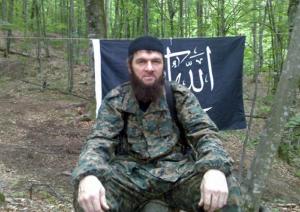Doku Umarov
The Olympic Games in Sochi are underway, and, at least so far, the world’s worst security fears have not come true.
But the threat will lurk for the duration of the Games. This part of Russia has a well-earned reputation for being one of the planet’s most dangerous regions, because it is a uniquely poisonous cauldron of violent militant jihadi ideology, separatist guerrilla warfare and personal grudges driven by Russia’s brutal war against the Chechens.
In a series of studies conducted from 2003 to 2005 constructing psychological autopsies of 65 Chechen suicide bombers, Khapta Ahmedova, a Chechen colleague, and I found all of them to have lost a family member to a violent death at the hands of the Russians. All acted out of trauma and revenge after having been inculcated with the fanatical militant jihadi ideology that preaches Islamic “martyrdom” as a way to exit one’s life heroically while striking a lethal blow at one’s enemies.
In addition, in strong contrast to the profile of Al Qaeda terrorists that has grown familiar to Americans, many of those who pose the most serious threat to Sochi are women.
Twenty-two-year-old Ruzanna Ibragimova a Dagestani woman, pictured in wanted posters, is dressed in a modest pink hijab with a scar across her face that she is said to have gained at the hands of the Russians. Last February, Ruzanna sat alongside her rebel husband in a car when the Russians killed him. Ruzanna escaped to live. Now, trained as a suicide terrorist, she is hell-bent on death — ready to use her body as a vehicle to avenge her husband’s death.
Oksana Aslanova, also from Dagestan, is also a widow. After the Russians killed her husband, the leader of the Jamaat Sharia in Dagestan, she volunteered to go as a “martyr.” She was trained and ready to explode herself at the Day of Russia last June, according to Russian news reports, but had to be held back for another event.
She is now believed to be lurking about Sochi fully armed and ready to take on the rewards of “martyrdom” – immediate entry to paradise where she will reunite with her husband and the promise that 70 of her remaining relatives will also gain entry to paradise upon their deaths as a result of her sacrifice.
Zaira Allieva and Dzannet Tshakhaeva, also from Dagestan, are also on the loose. They were close friends with Naida Asilova, who exploded herself on a bus in Volgograd last October. The two girls fled Dagestan a week later and are now thought to be also in the Sochi region — poised to activate as suicide bombers if given the opportunity.
The organization sponsoring these four women is an outgrowth of the Chechen separatist movement begun in 1992 with the breakup of the former Soviet Union. As then-Russian President Boris Yeltsin told the former republics to “Take all the freedom you can,” Ukraine, Belarus, Uzbekistan, Kazakhstan and Kyrgyzstan did just that.
But when the Chechens, conquered so many years ago by the Russians, also tried to break free, the Russians were unwilling for those inside their own federation to let them.
Part of the reason: Chechnya has oil. So two bloody wars ensued, with Vladimir Putin carpet-bombing the capital of Grozny in the second war, causing more than half the Chechen population to flee, many becoming refugees who resettled around the world.
Then-rebel leader Shamil Basaev, seeing that the West was not coming to his aid, became convinced by a middle easterner – Ibn al-Khattab – that the only way to win was to transition the rebel movement to a terrorist campaign that explicitly embraced martyrdom and suicide terrorism.
In 2000, Basaev began a campaign of suicide attacks. Distinguishing Chechnya from many other rebellions, from the beginning, women took part in over 30 acts of terror. These included blowing up two domestic flights, exploding subways, buses, trains; it also included mass-hostage takings – one in Moscow where over 800 theatergoers were held and another in Beslan where 1,300 school teachers, mothers and children were held. In this group women have taken part in suicide acts from the start. It was women who exploded themselves on planes, and women were involved in both hostage-takings as well.
As it has metastasized over the years, the Chechen suicide terror campaign has involved more than 115 suicide bombers – half of them women. The spillover from it has spread well beyond Chechnya into neighboring Dagestan, Ingushetia and beyond.
The present terrorist leader, Doku Umarov, declared the region in 2007 as the Caucasus Emirate. In 2013, he declared that he would not allow the Russians to hold the Olympics in Sochi over the dead bones of his Muslim compatriots, the Circassians. Following the Crimean war, where, in 1859, the Russians killed and deported Circassians from the region en masse, with an estimated 625,000 deaths in what historian Walter Richmond has labeled Europe’s first genocide.
Umarov now leads an organization that has since 2000 shown itself to be capable to standing up a significant militant and terrorist campaign against Putin’s formidable authority.
Importantly for those considering the possibility of terrorist acts at the Games, the rebel forces have frequently succeeded in penetrating Russian security forces through bribes and corruption.

NATALYA VASILYEVA/AP
Ruzanna Ibragimova
In 2004, the Chechens embarrassed Putin by placing explosives under the review stand of then-Chechen President Akhmad Kadyrov, who was blown to smithereens while viewing a parade of Russian military force.
Similarly, the Beslan hostage takers bragged to their hostages that they had “bought” them at a small price referencing that they had bribed their way from Chechnya into North Ossetia to take over the school. The terrorists there had also managed to have a cache of weapons placed under the floorboards of the school before their arrival.
Are Umarov’s cadres capable of placing explosives under the Russian review stand at Sochi? That’s unlikely, given that the Russians would be ready for it this time. And not only are the Russians scrutinizing the Olympic venue, but multinational forces are also working alongside them on the ground. While the Russians may take bribes to turn a blind eye, the FBI and other forces won’t.
Could he and his compatriots spirit in a cache of weapons and stage a Munich-style attack on the athletes themselves? Also unlikely, given Umarov’s stated ambivalence about attacking civilians and suicide attacks after the Beslan school hostage.
After the Beslan debacle, there was a worldwide backlash to Basaev’s decision to take women and children in a school hostage. In response, Umarov declared that his group would no longer attack civilians or use suicide terrorism. Their fight, he insisted, was with the Russian forces and their desire to gain independence from Putin’s rule. He reversed that position however when the Olympics were announced, urging his followers to “do their utmost to derail” them. He’s warned foreigners to avoid the Games.
That said, Umarov knows that gunning down the athletes themselves would likely result in a similar backlash. Expect him to avoid that tactic.
But it would be worse than naïve to expect Chechen terrorists to sit out the Games entirely. When the Sochi Olympics were announced, Umarov could not resist the worldwide stage and press opportunities presented. He was no doubt additionally irritated that Putin believed he could stage the Winter Olympics with impunity in this previously Muslim-dominated area, on-as he stated, “the bones of our ancestors.” That’s why he vowed to stop the Olympics.
Now he has a worldwide stage on which to play out his desires. And, as one of the only organized resistance movements to Putin’s dismantling of democratic freedoms, he may think he can win over adherents by flexing his militant muscles in the face of a frantic Russian security apparatus.
But can’t Putin, among the world’s most powerful strongmen, detect and snuff out whatever a rebel army might be planning – especially given the unprecedented surveillance infrastructure that’s in operation at Sochi?
While more than 40,000 Russian security forces have been dispatched to guard the Olympics, those that have been shipped in from other parts of Russia lack local knowledge and contacts. They have not yet won the trust of the local population.
Umarov’s cadres, by comparison, have tight-knit cells reliant on familial and religious bonds and they have demonstrated their capability to construct explosives, train and motivate operatives and pass security checkpoints.
Their cadres do not fear death. Their motto is “Victory or paradise!” They are ready to die for their cause.
They could also receive unexpected help from abroad. As half the population of Chechnya fled the second war’s carpet bombing, many now live abroad and have European, American, Canadian and Australian passports.
They could pass into Russia on clean passports, unsuspected. Tamerlan Tsarvaev, the Boston bomber, was after all originally from Chechnya and eluded U.S. and Russian surveillance when he traveled to and from Dagestan before attacking Boston.
Whatever “special package” the terrorists have planned for the 2014 Sochi Winter Olympics, spectators can take some comfort in the fact that their security is reliant on multinational cooperation among forces that are not all subject to legendary Russian corruption. The Olympic venue itself is likely to be secure. That said, transportation hubs and places where crowds gather in Sochi itself may be vulnerable to attack.
And, in at least one small way, the terrorists have already managed to disrupt Olympic plans. Most official delegations have decreased their size, some teams are leaving their family members home and ticket sales are down. As for further disruptions, let’s hope that while our athletes go for the gold, the terrorists are unable to do anything further to upstage them.
Anne Speckhard, Ph.D. is Adjunct Associate Professor of Psychiatry at Georgetown University in the Medical School and has interviewed over four hundred terrorists, their associates and close family members and their hostages in various countries around the world. She is author of the book “Talking to Terrorists.” This piece was printed originally in the New York Daily News Opinion Section February 9, 2014 http://www.nydailynews.com/opinion/sochi-grim-reapers-article-1.1606377#ixzz2swHh4ASw

